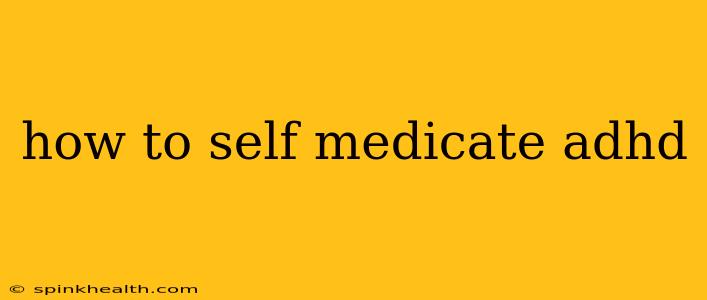The Perils and Pitfalls of Self-Treating ADHD: A Journey Through Misconceptions and Safe Practices
Let's be honest, the relentless internal whirlwind of ADHD can feel overwhelming. The constant battle against distractibility, impulsivity, and hyperactivity can leave you feeling utterly exhausted and desperate for relief. It's no wonder some individuals with ADHD turn to self-medication, seeking solace in readily available substances. However, this path is fraught with danger and rarely leads to genuine, long-term solutions. This article will delve into the misconceptions surrounding self-medication for ADHD, exploring safer and more effective approaches.
Before we go further, I must emphasize a crucial point: Self-medicating ADHD is incredibly risky and should be avoided. Improper use of medications, even seemingly benign substances, can have severe health consequences and worsen existing symptoms. It's crucial to seek professional help from a qualified healthcare provider.
Why Self-Medication for ADHD Is Dangerous
Self-treating ADHD involves the use of substances without proper medical supervision. This poses numerous risks, including:
- Incorrect Dosage: Even over-the-counter medications can be dangerous if taken in incorrect dosages. ADHD medications, specifically, require careful titration (adjusting dosage) by a professional to find the optimal level for each individual.
- Drug Interactions: Mixing medications, even seemingly harmless ones, can lead to unpredictable and potentially harmful interactions. This is especially crucial with ADHD medications, as they can interact negatively with other prescription drugs and supplements.
- Misdiagnosis: Many symptoms of ADHD mimic other conditions. Self-diagnosing and attempting self-treatment could mask a different underlying issue requiring a different approach.
- Addiction and Dependence: Substances used for self-medication can be habit-forming, leading to dependence and potentially severe withdrawal symptoms.
- Worsening Symptoms: Improper medication use can paradoxically worsen ADHD symptoms, creating a vicious cycle of dependence and escalating problems.
What Are the Common Misconceptions About Self-Treating ADHD?
Many individuals with ADHD, frustrated with their symptoms, fall prey to common misconceptions about self-medication. These include:
- "It's just caffeine; it can't hurt": While caffeine can provide a temporary boost in focus, it's not a substitute for proper ADHD treatment. Excessive caffeine intake can lead to anxiety, insomnia, and other adverse effects.
- "I can manage my symptoms with lifestyle changes alone": Lifestyle changes, such as improved sleep hygiene, regular exercise, and a healthy diet, are crucial components of ADHD management, but they rarely suffice to fully manage symptoms on their own.
- "I can get medication online without a prescription": This is illegal and dangerous. Purchasing medications online without a prescription can result in receiving counterfeit or contaminated drugs.
What Are Safe and Effective Alternatives to Self-Medication?
So, if self-medication is so dangerous, what should someone with ADHD do? The answer is straightforward: seek professional help. A comprehensive approach involves several key steps:
- Professional Diagnosis: A qualified healthcare professional, such as a psychiatrist or psychologist, can accurately diagnose ADHD and rule out other potential conditions.
- Therapy: Cognitive behavioral therapy (CBT) and other therapeutic interventions can teach coping mechanisms and strategies for managing ADHD symptoms.
- Medication (if necessary): Under the guidance of a physician, medication can be a valuable tool for managing ADHD symptoms. This approach requires regular monitoring and adjustment of dosage to minimize side effects and maximize benefits.
- Lifestyle Changes: Implementing healthy habits, such as regular exercise, a balanced diet, and adequate sleep, significantly contributes to overall well-being and can improve symptom management.
How Can I Find a Qualified Healthcare Professional for ADHD Treatment?
Finding the right professional can feel daunting, but it's a crucial step toward effective management. Start by:
- Consulting your primary care physician: They can provide referrals to specialists.
- Searching online directories: Many organizations offer online directories of mental health professionals.
- Asking for recommendations: Friends, family, or support groups can offer valuable suggestions.
The journey to managing ADHD is a personal one, and it requires patience, persistence, and professional guidance. Don’t let the complexities of the condition lead you down the dangerous path of self-medication. Reach out for help; you're not alone, and there are safe, effective ways to manage your symptoms and live a fulfilling life.

